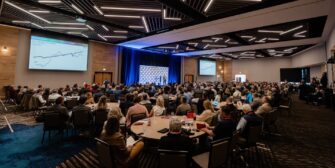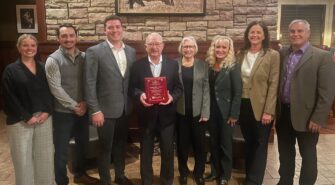Preview a ‘taste’ of family business at one-of-a-kind dinner
Recent News
Brothers Bryan and Keith Miller learned organizational leadership at a young age.
Their father was the academic vice president — akin to the chief operations officer — of a small college in their Nebraska hometown, where he and his wife worked for 51 years. Every immediate family member, several aunts and uncles, as well as many cousins and grandchildren all have worked at the college over the years.
Bryan earned a master’s and a doctorate degree in human development and family studies, and worked in senior management positions in for-profit and nonprofit organizations. In 1998, Bryan began his business consulting in Ames, Iowa, while teaching in a graduate program on topics such as working with larger organizations and family businesses.
Keith earned a bachelor’s degree in business administration with a focus on management and a master’s degree in organizational behavior. His professional life is anchored in 21 years as a commissioned officer in the Air Force, working in various locations and a broad spectrum of leadership situations.
Bryan incorporated Nebraska-based Human Systems Consulting in 2006, and Keith joined the firm in 2014. Bryan’s wife, Amy, and four of their six children have worked with HSC.
Here’s a closer look at their business and how they’re using their association membership to advance it.
Tell us about Human Systems Consulting. What kinds of services do you offer?
Bryan: Our primary services have been in the areas of organizational behavior and leadership. Through an intensive interview process, we help leaders figure out and find solutions to challenges that are primarily “people problems” — helping leaders gain “discretionary effort” from teams, leading to sustained effort and success. Our effectiveness is in the use of sound research methods to gain actionable data, but probably the best outcomes we achieve are when leaders tell us that they are “sleeping better” and “don’t dread coming into work anymore.”
Our very first consulting contract in 1998 was with a brother and sister running a large international business. My colleague and I utilized focus groups to develop action plans to improve employee satisfaction, which had worsened after an industrial accident. We worked with a subset of the 3,000 employees across nine plants.We followed this up with another contract with the company in 2002 to measure the progress that had been made. Since that time, we have worked with a number of organizations across the Midwest.
As organizational behavior specialists have you been uniquely positioned to see the struggles family businesses can encounter?
Bryan: Our advantage is in the deep understanding of human systems. From the early days of operating in the “fishbowl” of a small college community in a small town, to our education and training in human behavior, our extended experience “in the trenches” of leading teams and organizations, to, finally, being the “outside help” working with a number of organizations and leaders, we provide a depth of understanding that leads to an accurate assessment and solutions that work.
In one recent contract with a nonprofit, we were asked to come into an organization that had spent a year working to come to a working plan for continued leadership. The problem was that there really was no agreement, which was easily discovered in our assessment process. Poor problem assessment often leads to poor outcomes.
Keith: Growing up, all of our close friends were part of the same family business in a sense. Their dads worked for the same college of which our dad was the VP, and we were all members of the same church. We didn’t think much about it as kids, but we were aware that we were connected to these kids in a way that we weren’t to the other kids at school. It made a difference in what happened when we had a squabble. We knew we’d have to resolve the tension to have peace because we were going to be seeing them regularly whether or not we felt like it.
This close association over our growing-up years also helped us learn to appreciate each other as individuals. We learned to accept and even appreciate the ways in which our friends differed from us in their interests and talents. We didn’t agree on issues all of the time either. We learned that the expression of differing views, defended with integrity and listened to with respect, makes any organization a healthier one.
What connected you to the Prairie Family Business Association?
Keith: We’re interested in ways in which family businesses can sustain their health. PFBA provides a readily available source of inspiration and collaboration with an extended family of fellow business owners with whom to share struggles and ideas. Chances are high that someone within the PFBA has already successfully dealt with whatever issue your family business is facing.
Bryan: Having taught graduate courses on family businesses, I am interested in supporting our business as it continues to develop through the dimensions of ownership and management. My background as a family therapist has also created an interest in supporting other families in their developmental process as well.
You attended the association’s annual convention in Sioux Falls earlier this year. What were your impressions?
Bryan: I was most impressed by the families themselves. Talking to attendees, we regularly found family members from the third generation or beyond. To find a core of families dedicated to gaining education and support for the younger generations was terrific.
Secondly, I was pleased to find the mix of family business members and providers of services to family businesses. Some organizations serving family businesses prohibit providers of services as members — and who can blame them? We’ve all been annoyed by an overly pushy salesperson. But, perhaps not surprisingly since we are both a family business and provider, we prefer to see these two entities as collaborators to bring out the best outcomes for each family business.
Keith: Attending the conference allowed me to observe firsthand things I never would have been able to any other way. I saw clearly that there is a pattern in the growth of successful family businesses over time. For instance, the fourth-generation family businesses had similarities in their structures and approach to dealing with the inclusion of nonfamily employees as the business expanded. The first and second generation had a much different feel. Anyone hoping to sustain a family business will have a higher likelihood of success if they can forecast what the future holds by observing these sorts of trends.
You are helping connect Prairie Family’s resources with other businesses in Nebraska. What kind of potential do you see for the association to grow there?
Bryan: This was a primary interest and motivation for becoming a member and attending the conference. As someone who has worked intently with families for more than 20 years, there is nothing more important than being present when a family or business is experiencing a crisis or needs to engage in some new growth as an organization. Family businesses often do not get the resources they need. Resources that go beyond accounting, legal, business or family support services.
Keith: There are a lot of family businesses in Nebraska that are doing well because they’re really good at what they do. They have a passion for their product or service and have learned over time what works and what doesn’t. They put in long hours and know their market and their customers well. They are good at their business.
Are they equally good at understanding the legal and financial impact of succession? Do they have a plan in place to protect the family if a key player is suddenly not available to run the business? What if the intended heirs are having trouble resolving issues even before they take ownership? Having an association of peers to talk with about how their family has already handled situations like these could make the difference in their continued success.
What can people expect at your Sept. 7 event?
Bryan: I don’t exactly know! I do know that the PFBA will talk about the organization and how it supports family businesses. Since this is taking place in Nebraska, I’d expect a little “Husker talk” — and maybe “Hawkeye talk” — and a chat about the weather. Mostly though, I hope it is the beginning of a more formal support system for Nebraska’s family businesses.



